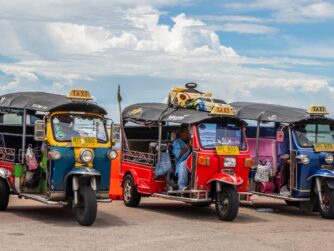Voice 1
Welcome to Spotlight. I’m Ryan Geertsma.
Voice 2
And I’m Robin Basselin. Spotlight uses a special English method of broadcasting. It is easier for people to understand, no matter where in the world they live.
Click here to follow along with this program on YouTube.
Voice 1
Which country do you think is the most peaceful in the world? Switzerland? Japan? Sweden? People often think of these countries as the world’s most peaceful countries but the Institute for Economics and Peace, or IEP, reports that none of them are the most peaceful country. You may be surprised by which country is number one. In 2014 the IEP reported that Iceland was the world’s most peaceful country!
Voice 2
Measuring peace is not a simple thing. But the IEP spends a lot of time researching this subject. And they have created a peace measurement called the Global Peace Index. Since 2007, the IEP has released a list of countries ranked from the most peaceful to the least peaceful. Today’s Spotlight is on the IEP’s Global Peace Index.
Voice 1
The idea for the Global Peace Index came from a man named Steve KilleIea. KilleIea is a wealthy businessman from Australia. He noticed that people often measure a country’s success by the size of its economy. But KilleIea did not think this should be the only measure of a country’s success. He believed that a country’s level of peace should also be an important part of measuring success. KilleIea believed that measuring peace would help us identify how and why some countries are peaceful and he believed that this would help all countries achieve better peace. So KilleIea started the Institute for Economics and Peace. The IEP’s goal is to study and measure levels of peace.
Voice 2
But how do you measure peace? This is a difficult and complex idea. The IEP worked with the Business Economist Intelligence Unit to develop a method for measuring a country’s state of peace. This system of rating peace is very complex. It measures 22 particular issues related to peace. But these issues are divided into three major subjects.
Voice 1
The first subject relates to the amount of conflict a country is currently involved in. The second subject relates to safety and security within a country. And lastly, the IEP looks at a country’s militarization. This means they consider the size of a country’s military and the amount of weapons it has. The IEP’s final rating is based on a formula. Sixty percent is from the state of peace within the country. Forty percent is from its state of peace with other countries.
Voice 2
But the Global Peace Index often measures complex situations. For example, the country of Israel has a high level of safety and security within its country. It also has a low level of crime. But it has a high level of militarization. It spends a lot of money on weapons and soldiers. And it is also involved in conflict with other countries. So, Israel has a lower rating of peace.
Voice 1
Another example is Brazil. Brazil has one of the lowest levels of military conflict in the world. But it does not have one of the highest peace ratings on the index. This is because Brazil has problems with safety within the country. one reason is because it is easy to buy small weapons in Brazil. Another reason is that Brazil sometimes experiences violent protests.
Voice 2
Switzerland is a famous example of a peaceful country. But it is not the most peaceful country on the IEP rating list. Switzerland does have a low level of crime. It also has a peaceful government. And it is not involved in any war. But Switzerland does export high numbers of weapons to other countries. So even though it is famous for peace, it does not rate as high as other countries like Iceland, Denmark, Austria, or New Zealand.
Voice 1
Not everyone agrees with the IEP’s rating system. Some people feel that the Global Peace Index does not measure all of the issues it should. One example is violence against women and children. Many people feel that a country is not at peace if its women and children experience violence. But the Global Peace Index does not measure the level of violence against women and children in its research.
Voice 2
Another criticism is that the index gives countries with large militaries a lower rating. Some people think that this is not fair. Often countries with small militaries make agreements with countries that have larger militaries. The countries with small militaries depend on the larger militaries to protect them. However, the countries with the small militaries get a higher rating of peace and the countries with the larger militaries get a lower rating of peace.
Voice 1
The Global Peace Index also does not recognize that there are particular issues that make it more difficult for some countries to achieve peace. For example, some countries are rich in important natural resources like oil. Other countries may attack these countries to gain their resources. Another issue is refugees. The IEP reports that high levels of refugees can cause conflict so a country with a high number of refugees gets a lower rating – even if they are trying to help peace by accepting refugees.
Voice 2
The Global Peace Index is definitely not perfect. But it does supply important information about the state of global peace. For example, the 2014 IEP report stated that the level of Global Peace has decreased every year for the past six years. IEP research also helps experts identify things that all of the most peaceful countries do or have in common. One major observation is that peace seems to be linked with development. Helen Clarke worked as the head of the United Nations Development Programme. In a speech she praised the IEP for helping the world understand what helps create peace. She said,
Voice 3
“There is clearly a strong relationship between peace and human development. Where violence and conflict are present, development cannot happen. We should also be clear that while peace matters for development, development matters for peace.”
Voice 1
The Global Peace Index shows that the most peaceful countries are also highly developed. They have strong economies and high levels of education and health care. Iceland is one of the world’s most developed countries. But not all highly developed countries are so peaceful. So, what makes Iceland so peaceful? Listen for another Spotlight program on the peaceful country of Iceland.
Voice 2
The writer of this program was Jen Hawkins. The producer was Michio Ozaki. the voices you heard were from the United States. All quotes were adapted and voiced by Spotlight. You can listen to this program again, and read it, on the Internet www.radioenglish.net. This program is called “Global Peace Index.”
Voice 1
How high would you rate your country on the Global Peace Index? What could change to make your country more peaceful? You can also leave your comments on our website. And find us on Facebook – just search for Spotlight Radio. You can also find us on YouTube, Instagram, and X. You can also get our programs delivered directly to your Android or Apple device through our free official Spotlight English app. We hope you can join us again for the next Spotlight program.
Goodbye
Question:
How high would you rate your country on the Global Peace Index? What could change to make your country more peaceful?





They were talked about tha kingdom’s and country’s and favourite countries
I want to give my vonluntary contribution about same área.
Rating Iraq now, It’s more peaceful than previous really.
We need to kill ignorance that’s only solution to develop Iraq more.
I am Severino Ramos, I am from Brazil, and I live in São Paulo City.
Dear Jen Hawkins, Michio Ozaki, Ryan Geertsma, and Robin Basselin
How are you?
Global Peace Index
Question 1 – How high would you rate your country on the Global Peace Index?
I would rate my country on the Global Peace Index as grade 0. Because here in my country, Brazil, everyone lives in fear at home, on the street, everywhere else.
Here in my country, Brazil, there is a right for people, and it is called human rights.
So the thieves, criminals, bad people, killers, do what they want to do against other people. Beyond that, bad people have a human right to be protected.
Our Police have worked hard to protect the Brazilian people and arrest bad people, but the justice system, judges, lawyers, and human rights groups defend them from jail.
Question 2 – What could change to make your country more peaceful?
I think that the system of justice should punish more strictly those bad people. Those criminals who kill a lot of people on the streets, in restaurants, at home, in buildings, to steal belongings from people, should be murdered by the Brazilian Police.
However, those bad people have protection from the group of human rights.
Therefore, if the justice system does not change the law, we will never have a peaceful country.
Thank you very much
Stay with God
Severino Ramos